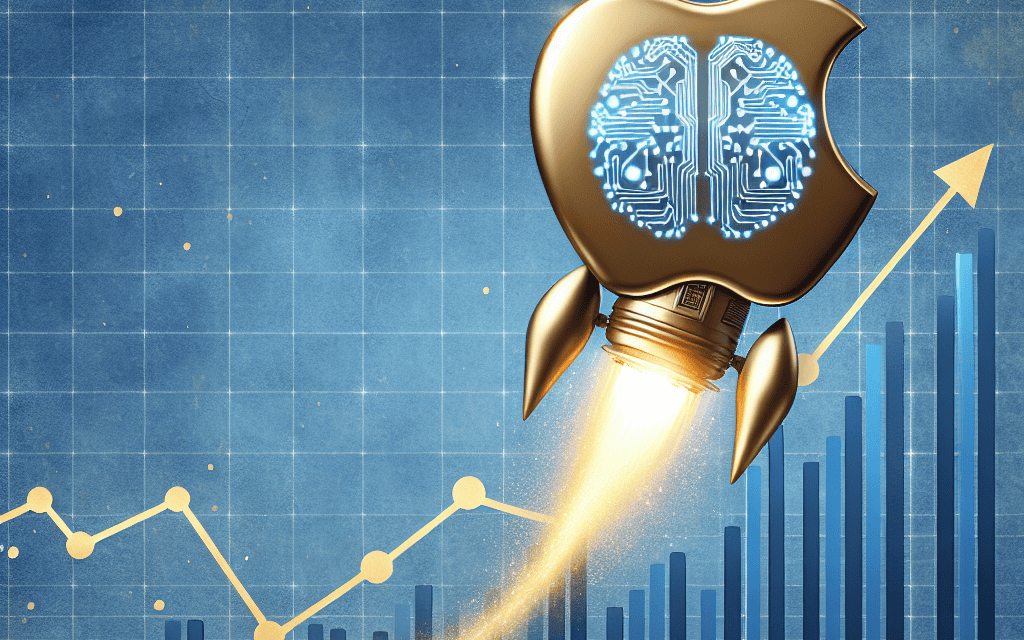“Apple Soars: AI Innovation Fuels iPhone Sales Surge!”
Introduction
Apple Inc.’s stock has reached a new record high, driven by growing optimism that advancements in artificial intelligence (AI) will significantly boost iPhone sales. Investors are increasingly confident that AI technologies will enhance the functionality and appeal of Apple’s flagship product, potentially leading to increased consumer demand and market share. This surge in stock value reflects the market’s positive outlook on Apple’s ability to integrate cutting-edge AI features into its devices, thereby maintaining its competitive edge in the tech industry. As AI continues to revolutionize the way users interact with technology, Apple is well-positioned to capitalize on this trend, further solidifying its status as a leader in innovation and consumer electronics.
Impact Of AI Advancements On Apple’s Stock Performance
Apple Inc.’s stock has recently reached unprecedented heights, driven by growing optimism that advancements in artificial intelligence (AI) will significantly boost iPhone sales. This surge in stock value reflects a broader market sentiment that AI technologies are poised to revolutionize consumer electronics, with Apple positioned at the forefront of this transformation. As investors increasingly recognize the potential of AI to enhance user experience and drive demand, Apple’s strategic focus on integrating AI into its products is seen as a pivotal factor in its continued success.
The integration of AI into Apple’s ecosystem is not a novel concept; however, recent developments suggest a more profound impact on the company’s product lineup, particularly the iPhone. AI technologies, such as machine learning and natural language processing, are expected to enhance the functionality and appeal of iPhones by offering more personalized and intuitive user experiences. For instance, AI-driven features like improved camera capabilities, smarter virtual assistants, and enhanced security measures are likely to attract consumers seeking cutting-edge technology in their smartphones. Consequently, this anticipated increase in demand for AI-enhanced iPhones is a key driver behind the recent surge in Apple’s stock price.
Moreover, Apple’s commitment to AI innovation is underscored by its substantial investments in research and development. The company has consistently allocated significant resources to advance its AI capabilities, acquiring numerous AI startups and hiring top talent in the field. These strategic moves are aimed at bolstering Apple’s competitive edge and ensuring that its products remain at the forefront of technological innovation. As a result, investors are increasingly confident in Apple’s ability to leverage AI advancements to maintain its market leadership and drive future growth.
In addition to enhancing product features, AI is also expected to play a crucial role in optimizing Apple’s supply chain and manufacturing processes. By utilizing AI-driven analytics and predictive modeling, Apple can improve efficiency, reduce costs, and better respond to market demands. This operational advantage not only strengthens Apple’s bottom line but also reinforces investor confidence in the company’s long-term profitability. As AI continues to permeate various aspects of Apple’s business operations, its impact on the company’s financial performance is likely to become even more pronounced.
Furthermore, the broader market context also contributes to the optimism surrounding Apple’s stock performance. As AI technologies gain traction across industries, consumer expectations for smart, AI-enabled devices are rising. This trend presents a significant opportunity for Apple, given its strong brand reputation and loyal customer base. By capitalizing on the growing demand for AI-driven products, Apple is well-positioned to capture a larger share of the market and sustain its growth trajectory.
In conclusion, the record-breaking performance of Apple’s stock is a testament to the market’s confidence in the company’s ability to harness AI advancements to drive iPhone sales and enhance its overall business operations. As Apple continues to innovate and integrate AI into its products and processes, the potential for increased consumer demand and operational efficiency becomes increasingly apparent. This optimism is reflected in the company’s stock valuation, signaling a promising outlook for Apple’s future in an AI-driven world. As investors and consumers alike anticipate the transformative impact of AI on Apple’s product offerings, the company’s strategic focus on this technology is likely to remain a key factor in its continued success.
How AI Innovations Are Driving iPhone Sales Growth
Apple Inc.’s stock has recently reached unprecedented heights, driven by growing optimism that advancements in artificial intelligence (AI) will significantly boost iPhone sales. This surge in stock value reflects a broader market sentiment that AI innovations are poised to transform the consumer electronics landscape, with Apple positioned at the forefront of this technological evolution. As AI continues to permeate various aspects of daily life, its integration into smartphones, particularly iPhones, is expected to enhance user experience, thereby driving demand and sales growth.
The integration of AI into iPhones is not a novel concept; however, recent developments suggest a more profound and impactful application of this technology. Apple’s commitment to AI is evident in its continuous investment in research and development, focusing on machine learning and neural networks. These efforts have culminated in features such as improved facial recognition, enhanced camera capabilities, and more intuitive virtual assistants. By leveraging AI, Apple aims to offer a more personalized and efficient user experience, which is increasingly becoming a key differentiator in the competitive smartphone market.
Moreover, the introduction of AI-driven features in iPhones aligns with the growing consumer demand for smarter and more capable devices. As users become more reliant on their smartphones for a wide range of activities, from communication to entertainment and productivity, the need for devices that can anticipate and adapt to their needs becomes paramount. AI enables iPhones to learn from user behavior, offering tailored suggestions and automating routine tasks, thereby enhancing convenience and user satisfaction. This, in turn, is likely to contribute to higher customer retention rates and attract new users, further bolstering iPhone sales.
In addition to enhancing user experience, AI innovations are also expected to drive iPhone sales by enabling new functionalities that were previously unattainable. For instance, AI-powered augmented reality (AR) applications are set to revolutionize the way users interact with their environment, offering immersive experiences that blend the digital and physical worlds. Apple’s ARKit, a platform for developing AR applications, is a testament to the company’s commitment to exploring the potential of AI in creating novel user experiences. As AR technology becomes more sophisticated and accessible, it is anticipated to become a significant selling point for iPhones, appealing to tech-savvy consumers and early adopters.
Furthermore, the integration of AI into iPhones is likely to have a ripple effect on the broader Apple ecosystem. As iPhones become more intelligent and capable, they are expected to drive increased adoption of other Apple products and services, such as the Apple Watch, AirPods, and Apple Music. This interconnected ecosystem, powered by AI, offers a seamless and cohesive user experience, encouraging consumers to invest in multiple Apple products. Consequently, the growth in iPhone sales is likely to have a positive impact on Apple’s overall revenue and market share.
In conclusion, the optimism surrounding Apple’s stock is well-founded, as AI innovations are poised to play a pivotal role in driving iPhone sales growth. By enhancing user experience, enabling new functionalities, and strengthening the Apple ecosystem, AI is set to transform the iPhone into a more indispensable tool for consumers. As Apple continues to push the boundaries of what is possible with AI, it is likely to maintain its competitive edge in the smartphone market, ensuring sustained growth and profitability in the years to come.
The Role Of AI In Apple’s Market Valuation Surge
Apple Inc.’s stock has recently reached unprecedented heights, driven by growing optimism that advancements in artificial intelligence (AI) will significantly boost iPhone sales. This surge in market valuation reflects a broader trend where technology companies are increasingly leveraging AI to enhance their product offerings and capture consumer interest. As AI continues to evolve, its integration into Apple’s ecosystem is expected to play a pivotal role in shaping the company’s future growth trajectory.
To understand the impact of AI on Apple’s market valuation, it is essential to consider the broader context of AI’s role in the technology sector. AI has become a cornerstone of innovation, enabling companies to develop smarter, more intuitive products that cater to the evolving needs of consumers. For Apple, a company renowned for its commitment to cutting-edge technology and user experience, AI presents an opportunity to further differentiate its products in a highly competitive market.
One of the key areas where AI is expected to drive iPhone sales is through enhanced user experience. AI-powered features, such as improved voice recognition, personalized recommendations, and advanced camera capabilities, offer users a more seamless and engaging interaction with their devices. These features not only enhance the functionality of the iPhone but also create a more personalized experience that resonates with consumers. As a result, the integration of AI into Apple’s products is likely to attract new customers while encouraging existing users to upgrade to the latest models.
Moreover, AI’s potential to revolutionize the way users interact with their devices extends beyond individual features. The development of AI-driven applications and services can create an ecosystem that enhances the overall value proposition of owning an iPhone. For instance, AI can facilitate more efficient and secure data management, enabling users to store and access information with greater ease and confidence. Additionally, AI can support the development of innovative applications that cater to specific user needs, further solidifying Apple’s position as a leader in the technology space.
In addition to enhancing user experience, AI also offers significant opportunities for Apple in terms of operational efficiency and cost reduction. By leveraging AI-driven analytics and automation, Apple can streamline its supply chain, optimize production processes, and improve inventory management. These efficiencies can lead to cost savings, which can be reinvested into research and development to drive further innovation. Consequently, the strategic integration of AI into Apple’s operations can contribute to sustained growth and profitability, reinforcing investor confidence in the company’s long-term prospects.
Furthermore, the growing emphasis on AI aligns with broader industry trends, where companies are increasingly prioritizing digital transformation and innovation. As consumers become more accustomed to AI-driven technologies, their expectations for seamless, intelligent experiences continue to rise. Apple’s commitment to integrating AI into its products positions the company to meet these expectations and maintain its competitive edge in the market.
In conclusion, the recent surge in Apple’s stock price underscores the significant role that AI is expected to play in driving iPhone sales and enhancing the company’s market valuation. By leveraging AI to improve user experience, streamline operations, and foster innovation, Apple is well-positioned to capitalize on the growing demand for intelligent, connected devices. As AI continues to evolve, its integration into Apple’s ecosystem will likely remain a key driver of the company’s success, ensuring that it remains at the forefront of technological advancement in the years to come.
Investor Optimism: AI’s Influence On Apple’s Future

Apple Inc.’s stock has recently reached unprecedented heights, driven by growing investor optimism surrounding the potential impact of artificial intelligence (AI) on the company’s future, particularly in relation to iPhone sales. This surge in stock value reflects a broader trend in the technology sector, where AI is increasingly seen as a transformative force capable of reshaping consumer experiences and driving revenue growth. As investors look to the future, they are placing significant bets on Apple’s ability to harness AI technologies to enhance its product offerings and maintain its competitive edge in the market.
The integration of AI into Apple’s ecosystem is not a novel concept; however, recent advancements in AI capabilities have reignited interest in how these technologies can be leveraged to improve the functionality and appeal of Apple’s flagship product, the iPhone. AI has the potential to revolutionize various aspects of the iPhone, from enhancing camera capabilities and battery life to improving user interface and personalization features. As a result, investors are increasingly optimistic that these innovations will drive a new wave of consumer demand, thereby boosting iPhone sales and, consequently, Apple’s financial performance.
Moreover, Apple’s commitment to AI research and development is evident in its strategic acquisitions and investments. The company has consistently acquired AI startups and hired top talent in the field, signaling its intent to remain at the forefront of AI innovation. This proactive approach not only positions Apple to capitalize on emerging AI trends but also reassures investors of the company’s long-term growth prospects. By integrating cutting-edge AI technologies into its products, Apple aims to deliver enhanced user experiences that differentiate its offerings from those of competitors.
In addition to product enhancements, AI is also expected to play a crucial role in optimizing Apple’s supply chain and manufacturing processes. By leveraging AI-driven analytics and automation, Apple can improve efficiency, reduce costs, and respond more swiftly to market demands. This operational agility is particularly important in an industry characterized by rapid technological advancements and shifting consumer preferences. As such, investors are confident that AI will enable Apple to maintain its leadership position in the global smartphone market.
Furthermore, the broader economic context also contributes to the positive sentiment surrounding Apple’s stock. As the global economy gradually recovers from the disruptions caused by the COVID-19 pandemic, consumer spending on technology products is expected to rebound. This anticipated increase in demand, coupled with Apple’s strategic focus on AI, creates a favorable environment for the company’s growth. Investors are thus optimistic that Apple will continue to deliver strong financial results, further bolstering its stock performance.
In conclusion, the record high of Apple’s stock is a testament to the growing investor confidence in the company’s ability to leverage AI technologies to drive future growth. As AI continues to evolve and reshape the technology landscape, Apple is well-positioned to capitalize on these developments and enhance its product offerings. By integrating AI into its ecosystem, optimizing its operations, and responding to changing market dynamics, Apple is poised to maintain its competitive edge and deliver sustained value to its shareholders. Consequently, the optimism surrounding AI’s influence on Apple’s future is likely to persist, reinforcing the company’s status as a leader in the technology sector.
Analyzing The Correlation Between AI Developments And Apple Stock
Apple Inc., a titan in the technology industry, has recently witnessed its stock reaching unprecedented heights, driven by growing optimism that advancements in artificial intelligence (AI) will significantly boost iPhone sales. This surge in stock value underscores the intricate relationship between technological innovation and market performance, particularly in the context of AI’s transformative potential. As investors and analysts closely monitor these developments, it becomes essential to explore the underlying factors contributing to this correlation and the broader implications for Apple’s future.
To begin with, the integration of AI into consumer electronics, especially smartphones, has been a game-changer in enhancing user experience and functionality. Apple’s commitment to incorporating AI-driven features into its iPhone lineup has not only differentiated its products from competitors but also positioned the company as a leader in innovation. Features such as improved camera capabilities, personalized user experiences, and enhanced security measures are all powered by AI, making iPhones more appealing to a tech-savvy consumer base. Consequently, this has fueled expectations that AI will continue to drive demand for iPhones, thereby positively impacting Apple’s financial performance.
Moreover, the strategic investments Apple has made in AI research and development further bolster investor confidence. The company’s acquisition of AI startups and the expansion of its AI research teams signal a long-term commitment to harnessing AI’s potential. These efforts are expected to yield cutting-edge technologies that could redefine the smartphone market, thus providing Apple with a competitive edge. As a result, investors are increasingly optimistic about the company’s ability to sustain growth and profitability, which is reflected in the rising stock prices.
In addition to product enhancements, AI’s role in optimizing Apple’s supply chain and manufacturing processes cannot be overlooked. By leveraging AI-driven analytics and automation, Apple can streamline operations, reduce costs, and improve efficiency. This operational excellence not only enhances profit margins but also ensures that Apple can meet the growing demand for its products without compromising on quality. Such improvements in operational efficiency are likely to have a positive impact on the company’s bottom line, further justifying the bullish sentiment surrounding its stock.
Furthermore, the broader market context also plays a crucial role in shaping investor perceptions. As AI continues to revolutionize various industries, companies that are at the forefront of this technological wave are perceived as more resilient and adaptable to future challenges. Apple’s proactive approach to integrating AI into its business model positions it favorably in the eyes of investors who are keen on capitalizing on the AI boom. This perception is reinforced by the company’s strong brand reputation, loyal customer base, and robust financial health, all of which contribute to its stock’s attractiveness.
In conclusion, the record highs in Apple stock can be attributed to a confluence of factors, with AI developments playing a pivotal role. The anticipation that AI will drive iPhone sales is not merely speculative but grounded in Apple’s strategic initiatives and market positioning. As the company continues to innovate and adapt to the evolving technological landscape, the correlation between AI advancements and Apple’s stock performance is likely to strengthen. This dynamic not only highlights the importance of AI in shaping the future of consumer electronics but also underscores the critical role of strategic foresight in sustaining corporate success.
Apple’s Strategic AI Investments And Their Effect On Stock Prices
Apple Inc., a titan in the technology industry, has recently witnessed its stock prices soar to unprecedented levels, driven by growing optimism that advancements in artificial intelligence (AI) will significantly boost iPhone sales. This surge in stock value reflects investor confidence in Apple’s strategic investments in AI technologies, which are anticipated to enhance the functionality and appeal of its flagship product, the iPhone. As the company continues to integrate AI into its ecosystem, it is essential to examine how these developments are influencing market perceptions and, consequently, Apple’s stock performance.
In recent years, Apple has made substantial investments in AI, recognizing its potential to revolutionize the user experience across its product line. The integration of AI into the iPhone, for instance, has been a focal point of Apple’s strategy. By leveraging machine learning and advanced algorithms, Apple aims to offer users a more personalized and intuitive experience. Features such as improved facial recognition, enhanced camera capabilities, and smarter virtual assistants are just a few examples of how AI is being utilized to make the iPhone more appealing to consumers.
Moreover, Apple’s commitment to AI extends beyond hardware enhancements. The company has been actively acquiring AI startups and investing in research and development to bolster its capabilities in this domain. These strategic acquisitions not only bring in cutting-edge technology but also infuse Apple with fresh talent and innovative ideas. As a result, Apple is well-positioned to maintain its competitive edge in the rapidly evolving tech landscape.
The impact of these AI-driven innovations on iPhone sales cannot be overstated. As consumers increasingly seek devices that offer seamless integration with their digital lives, the demand for AI-enhanced smartphones is on the rise. Apple’s ability to deliver on these expectations has been a key factor in driving its stock prices to record highs. Investors are particularly optimistic about the potential for AI to open new revenue streams and expand Apple’s market share, especially in emerging markets where smartphone penetration is still growing.
Furthermore, the broader implications of AI on Apple’s ecosystem are also contributing to the positive sentiment surrounding its stock. The integration of AI across Apple’s suite of products, including the iPad, Mac, and Apple Watch, creates a cohesive and interconnected user experience. This ecosystem approach not only enhances customer loyalty but also encourages users to invest in multiple Apple products, thereby increasing the company’s overall revenue.
In addition to these strategic advantages, Apple’s strong financial performance and robust balance sheet provide a solid foundation for continued investment in AI. The company’s ability to generate substantial cash flow allows it to fund research and development initiatives without compromising its financial stability. This financial strength reassures investors that Apple is well-equipped to navigate the challenges and opportunities presented by the AI revolution.
In conclusion, Apple’s strategic investments in artificial intelligence are playing a pivotal role in driving its stock prices to new heights. By enhancing the functionality and appeal of its products, particularly the iPhone, Apple is poised to capitalize on the growing demand for AI-driven technologies. As the company continues to innovate and expand its AI capabilities, it is likely to maintain its position as a leader in the tech industry, further solidifying investor confidence and sustaining its upward trajectory in the stock market.
The Future Of iPhone Sales: AI As A Catalyst For Growth
Apple Inc.’s stock has recently reached unprecedented heights, driven by growing optimism that advancements in artificial intelligence (AI) will significantly boost iPhone sales. This surge in stock value reflects a broader market sentiment that AI technologies are poised to revolutionize the smartphone industry, with Apple positioned at the forefront of this transformation. As investors and consumers alike anticipate the integration of AI into Apple’s flagship product, the iPhone, the potential for enhanced user experiences and increased demand becomes increasingly apparent.
The integration of AI into smartphones is not a novel concept; however, the sophistication and capabilities of AI technologies have advanced considerably in recent years. Apple has consistently demonstrated its commitment to innovation, and its strategic investments in AI research and development underscore its intent to leverage these technologies to enhance its product offerings. By incorporating AI into the iPhone, Apple aims to deliver a more personalized and intuitive user experience, which could, in turn, drive higher sales.
One of the key areas where AI is expected to make a significant impact is in the realm of user interaction. Through machine learning algorithms and natural language processing, AI can enable more seamless and efficient communication between users and their devices. For instance, Apple’s virtual assistant, Siri, is continually being refined to understand and respond to user queries more accurately. As these improvements are integrated into future iPhone models, users can expect a more responsive and intelligent assistant that can anticipate their needs and preferences.
Moreover, AI has the potential to enhance the iPhone’s camera capabilities, a feature that has consistently been a major selling point for Apple’s smartphones. By utilizing AI-driven image processing, future iPhones could offer superior photo and video quality, even in challenging lighting conditions. This advancement would not only appeal to photography enthusiasts but also to the average consumer seeking to capture high-quality images effortlessly. As a result, the enhanced camera features could serve as a compelling reason for consumers to upgrade to the latest iPhone models.
In addition to improving user interaction and camera functionality, AI can also play a crucial role in optimizing device performance and battery life. By analyzing user behavior and usage patterns, AI algorithms can intelligently manage system resources, ensuring that the device operates efficiently while conserving energy. This capability is particularly important as consumers increasingly rely on their smartphones for a wide range of tasks, from streaming media to managing work-related activities. An iPhone that can deliver robust performance without compromising battery life would undoubtedly be attractive to potential buyers.
Furthermore, the integration of AI into the iPhone aligns with broader trends in the technology industry, where AI is being harnessed to drive innovation across various sectors. As consumers become more accustomed to AI-enhanced products and services, their expectations for smart devices will continue to rise. Apple’s proactive approach to incorporating AI into its iPhones positions the company to meet these evolving consumer demands, thereby maintaining its competitive edge in the market.
In conclusion, the record-breaking surge in Apple stock reflects a growing confidence in the company’s ability to harness AI as a catalyst for iPhone sales growth. By enhancing user interaction, camera capabilities, and device performance, AI has the potential to redefine the iPhone experience, making it more appealing to consumers. As Apple continues to innovate and integrate AI into its products, the future of iPhone sales appears promising, with AI serving as a key driver of growth and success.
Q&A
1. **Question:** What recent event caused Apple stock to hit a record high?
– **Answer:** Optimism that AI advancements will spur iPhone sales.
2. **Question:** How is AI expected to impact iPhone sales according to analysts?
– **Answer:** AI is expected to enhance iPhone features, driving consumer interest and boosting sales.
3. **Question:** What specific AI features are anticipated to be integrated into iPhones?
– **Answer:** Potential features include improved camera capabilities, enhanced voice recognition, and personalized user experiences.
4. **Question:** How have investors reacted to the news of AI integration in iPhones?
– **Answer:** Investors have shown increased confidence, leading to a rise in Apple’s stock price.
5. **Question:** What is the broader market sentiment regarding AI’s role in consumer electronics?
– **Answer:** There is a positive sentiment that AI will significantly enhance the functionality and appeal of consumer electronics.
6. **Question:** How does Apple’s focus on AI compare to its competitors?
– **Answer:** Apple is seen as a leader in integrating AI into its products, setting a benchmark for competitors.
7. **Question:** What are the potential risks associated with relying on AI to boost iPhone sales?
– **Answer:** Risks include technological challenges, privacy concerns, and the possibility of unmet consumer expectations.
Conclusion
Apple’s stock reaching a record high reflects investor optimism that advancements in artificial intelligence will drive increased iPhone sales. This sentiment is likely fueled by expectations that AI enhancements could lead to more innovative features, improved user experiences, and greater consumer demand. As AI continues to integrate into Apple’s ecosystem, it may further solidify the company’s market position and contribute to sustained financial growth. However, the long-term impact will depend on Apple’s ability to effectively leverage AI technologies to meet consumer expectations and maintain its competitive edge in the tech industry.





